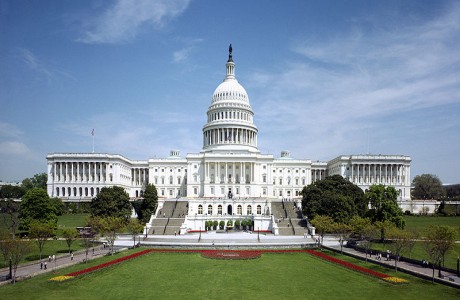The U.S. Senate unanimously approved on Monday a package of new economic sanctions on Iran’s oil sector just days ahead of a meeting in Baghdad between major world powers and Tehran.
The sanctions add to a raft of punitive measures by the United States and the European Union aimed at shrinking Iran’s oil revenues to force it to halt a nuclear program the West suspects is being used to build an atomic bomb.
Iran has said its nuclear program is for civilian purposes.
The new package would extend sanctions to cover dealings with the National Iranian Oil Co. and National Iranian Tanker Co., if they are deemed to be an agent or affiliate of the Revolutionary Guards. It aims to close a potential loophole that could have allowed Tehran to continue selling some of its oil using its own fleet.
The House of Representatives passed its version of the bill in December and now the Senate and House must work out their differences in the legislation before it is signed into law by President Barack Obama.
“This bill is another tool that will demonstrate to Iran that the United States is not backing down,” Robert Menendez, the Democratic senator who helped craft the legislation, said on the Senate floor.
“Today, the U.S. Senate put Iranian leaders on notice that they must halt all uranium enrichment activities or face another round of economic sanctions from the United States,” said Republican Senator Mark Kirk, a co-author of the bill, in a statement. The Senate bill was brought up on Thursday but was blocked by Republicans who wanted some parts toughened up.
Iran, OPEC’s second-largest producer, exports most of its 2.2 million barrels of oil per day to Asia, home to its four main customers: China, Japan, India and South Korea.
All four nations have cut back on their purchases, dissuaded by the previous package of U.S. financial sanctions that due to take effect at the end of June as well as an EU oil embargo and a ban on shipping insurance, which take effect on July 1.
The U.S. sanctions threaten to shut out importers of Iranian oil from the U.S. financial system unless they make substantial, sustained cuts to their purchases. Washington has already granted 10 EU nations and Japan a waiver from these measures and is pressuring Iran’s main buyers China and India to comply.
In addition to totally banning Iranian oil imports, the EU measures prohibit European insurers from covering Iranian oil exports anywhere in the world, which would leave importers exposed to personal injury and pollution claims. Typically, a supertanker insures against these liabilities to the tune of $1 billion per shipment.
Almost 90 percent of the world’s tanker insurance is based in Europe. South Korea will effectively become the first of Iran’s major Asian customers to halt purchases from July due to the ban.
The cumulative impact of the U.S. sanctions will be severe, said Suzanne Maloney, a senior fellow at the Brookings Institution’s Saban Centre for Middle East Policy.
“Right now, both sides are playing a game of chicken – the Iranians want to see how much they can get and how little they can give, whereas Washington and its allies are counting on the looming threat of impending sanctions to elicit more concessions on the part of Tehran,” Maloney said.
The escalating Western sanctions, and threats by Israel and the United States of last-ditch military action, have helped to push up world oil prices, compounding the economic misery wrought by debt crises in many industrialized countries.
The U.N. nuclear watchdog chief held talks in Tehran on Monday ahead of a meeting between major powers and Iranian officials this week, but there was no immediate sign of a breakthrough.
During the meeting in Baghdad, the United States, Britain, France, Russia, China and Germany will try and make Iran stop the higher-grade uranium enrichment it started two years ago and has since expanded.
Paul Pillar, a former CIA analyst for the Near East and Persian Gulf region, said any new sanctions could be counterproductive ahead of the talks as Iran may think the West is less interested in a deal than in undermining the regime.
“The biggest requirement now for getting an agreement is not to pile on still more sanctions, but instead to persuade the Iranians that if they make concessions the sanctions will be eased,” said Pillar, now a security studies professor at Georgetown University.



